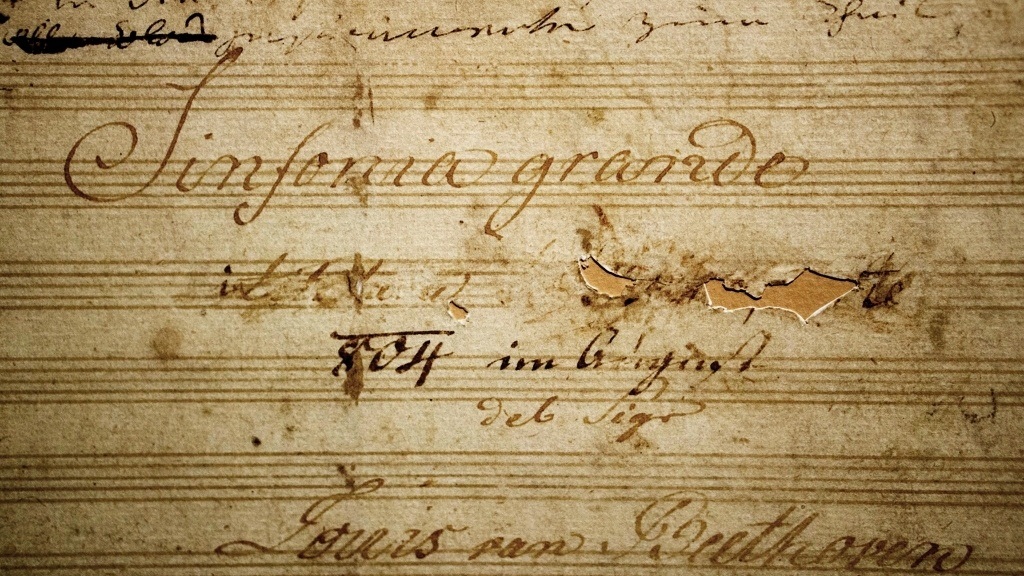The Romantic era in music may have begun, unofficially, with the ferocious opening hammer blows of Beethoven’s Third Symphony. As the story goes, this monumental and revolutionary music was originally dedicated to Napoleon Bonaparte. When Napoleon crowned himself Emperor of France in 1804, Beethoven reportedly scratched out the dedication on the title page (shown above) and re-dedicated the Symphony to the Hero (“Eroica”), exclaiming
So he is no more than a common mortal! Now, too, he will tread under foot all the rights of Man, indulge only his ambition; now he will think himself superior to all men, become a tyrant!
In fact, this is music so groundbreaking and cosmic that even a figure as ambitious as Napoleon pales in comparison. The “Eroica” transformed the symphony to an entirely new scale and dramatic weight. Its jarring dissonances and off-center rhythm still feel “modern,” and seem to anticipate the discordant sounds of the twentieth century. There are strange moments of haunting mystery, such as the “false” horn entrance in the first movement.
Leonard Bernstein, the last century’s consummate music educator and passionate cheerleader, provides us with a fascinating analysis of Beethoven’s “Eroica.” He discusses the first movement’s displaced accents, which frequently tear apart the underlying feeling of three, and the way the music develops with a sense of inevitability from a supremely simple musical idea. He outlines the drama of the second movement, in which a sombre funeral march is interrupted by a heroically transformative fugue. He points out the intense, quiet, pent-up energy of the Scherzo, which suddenly explodes with full fury. He shows how a simple, tip-toeing, even “trivial” motive in the final movement provides the foundation for a vast array of adventurous variations.
All of this drama comes to life in Bernstein’s 1978 concert recording with the Vienna Philharmonic. This film begins with three minutes of additional commentary by Bernstein, and then plunges us headlong into the music:
https://youtu.be/-Ie6tfedTM4


To ~ Timothy Judd
This topic is ageless and fascinating!!! Having seen last week end’s revisit to the Leonard Bernstein famed ‘Young People’s Concerts’, televised on CBS TV
weekly programme’s in the late ’50’s and 60’s, it was truly moving to go back
to. Time of Earnest in America ~ In so doing, an entire generation & 1/2 were
treated to the highest form of Culture, learning classical, romantic & even jazz
Musical Concepts from America’s most adored Music Class Teacher, Maestro
Leonard Bernstein with the New York Philharmonic plus grand soloist’s and to become Acclaimed Artist’s including Andre Watts, Pianist & Christa Ludwig,
Viennese born Mezzo Soprano ‘star’ of the Vienna State Opera + her husband Walter Berry ~ Bernstein’s Beethoven ‘Eroica’ was revelatory & not intended to be strictly “romantic”. His Third Symphony is a Diary of the Time’s he lived in, brilliantly etched yet stretched for poetry of utter Love from the vulnerable
part of Beethoven’s Soul, deliberately kept in tact yet restricted from those he
probably felt were not fully capable of accepting & feeling his tenderness ~ A
comment on the Violin Network seemed shallow in expressing the thought of
Ludwig van Beethoven ‘not being a Romantic.’ It’s very possible & probable
LvB didn’t pay much attention to labels for he was far too engaged & involved
in creating ‘sound paintings’ reflecting his perception of the Times and with
uncanny accuracy ~ (Read Tim Judd’s descriptions of Beethoven’s ‘sixth sense’
view/s re Napoleon’s future behaviour. LvB knew his ‘customer’s’, and How!!
Thanking Timothy Judd for carrying the Beethoven Mantle whilst aligning it to
this Centennial Celebratory Year of Leonard Bernstein’s Birth, as is said just a bit “across the pond”, Carry on, ole’ chap!!!
Musically yours ~
Elisabeth Matesky / Chicago